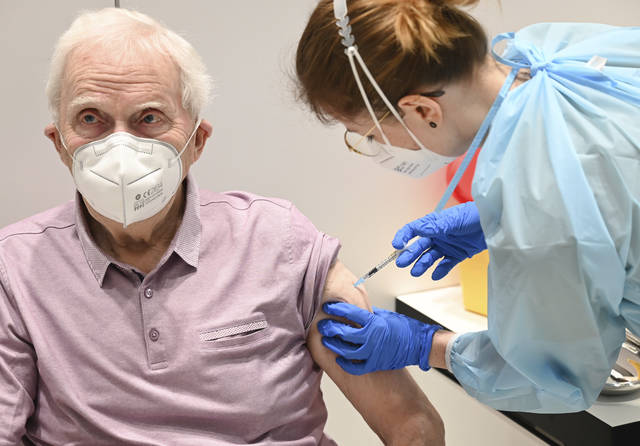
Richard Kilian from Wiesbaden-Schierstein is vaccinated with the Biontech/Pfizer vaccine by Fenna Martin at the vaccination center in the RMCC convention center in Wiesbaden, Germany on Tuesday. Here in Pennsylvania, those 65 and older and those younger who have serious medical conditions are now eligible for vaccination.
Arne Dedert | dpa via AP
Shots open to those 65 and up, others with serious medical conditions, but supply still lags
Pennsylvania residents 65 and older and those younger who have serious medical conditions are now eligible for COVID-19 vaccinations, the state health department announced Tuesday.
Previously, these two groups were in a later vaccination phase. The state made the change to comply with the latest federal government directives, officials said.
In addition to pregnancy, serious medical conditions include COPD (chronic obstructive pulmonary disease), cancer, sickle sell disease and chronic kidney disease, said state health Deputy Secretary for Health Promotion and Disease Prevention Cindy Findley, who announced the revision.
The other conditions allowing residents 16 to 64 to get vaccinated now, according to the state site: Down Syndrome; heart conditions, such as heart failure, coronary artery disease, or cardiomyopathies; a weakened immune system due to transplants, immune deficiencies, HIV or use of corticosteroids or other immune-weakening medicines; obesity; being a smoker; and type 2 diabetes mellitus.
These conditions are based on guidance from the Centers for Disease Control and Prevention, or CDC, on those that put people most at increased risk for severe illness, the state said.
The state’s first vaccination phase known as 1A, which started weeks ago, also includes health care workers and residents and employees of nursing homes and assisted living facilities.
Find a provider
Findley advised eligible residents to go to www.health.pa.gov and view an interactive map to find a vaccine provider near them and schedule an appointment using the contact information provided.
Patience will be required because there are not yet enough vaccines from the federal government to meet the demand, she said.
With the addition of the new groups, 3.5 million state residents are now in the first phase. She estimated it will take weeks to vaccinate everyone in the first phase.
A screening tool also is available on the site for residents unsure if they are eligible under the serious medical conditions category.
To access this tool and other steps, click on the “COVID-19 Vaccine Information for the Public” link on the state site and the box with the question “When am I eligible?”
Health care workers also should schedule their vaccinations if they have not yet been immunized, officials said. The number remaining is unclear because the state has received mixed responses on whether all health care workers not associated with hospitals have been vaccinated, said Findley, who also heads the state’s COVID-19 vaccine taskforce.
All residents scheduling appointments will receive a vaccination card that serves as a reminder to book a second dose required for full vaccination.
Both the outgoing and incoming federal administrations support vaccinating those 65 and older first, Findley said.
“These are the people who are more likely to get very sick from COVID-19 and are more likely to die from it,” she said.
Others must wait
Adding the two new groups to 1A means it will take longer to advance to 1B, which covers law enforcement, fire/rescue and emergency services personnel, corrections officers, clergy and workers in public transit, grocery stores, education, manufacturing, the U.S. Postal Service and childcare and congregate-care facilities that were not part of the still-ongoing initial 1A phase.
Findley said teachers, firefighters, police others in 1B “play a vital role” in communities, but the state must follow federal recommendations.
Under the prior plan, 1B included those 75 and older in addition to many essential workers. Those 65 to 74 and younger than that with high-risk medical conditions previously were in the 1C phase that includes workers in various industries, such as information technology, banking, construction and food service.
Residents ineligible in the first three groups must wait until the second phase.
This phased approach is necessary to distribute the vaccine in an “ethical, equitable and efficient” way, she said.
The state health department will provide regular updates on vaccination progress in 1A and cannot estimate when 1B will begin, Findley said.
“We’re basically at the mercy of how much vaccine we receive,” Findley said. “The more vaccine we receive, the more that we can engage with our partners, the more we can engage with setting up mass vaccination clinics and spreading that vaccine across the state.”
Finding locations
The state’s interactive map lists providers registered to receive the vaccine, and it will be updated Mondays, Wednesdays and Fridays to provide additional options, the site says.
On Tuesday afternoon, 12 pharmacies and health care providers were listed on the map in the county. Green dots indicate a facility has received vaccines and may have vaccine availability, while the red dots mean no vaccines are available there at this time.
For example, the Crestwood Pharmacy in Mountain Top has a green dot, but a representative said it cannot provide vaccines until it receives more doses. With many busy signals anticipated with an influx of callers, the pharmacy encouraged residents to visit the listed website and enter basic information to be contacted for an appointment.
Another listed pharmacy contained a voice message directing callers seeking vaccinations through its website.
Geisinger announced Tuesday it is expanding its vaccine distribution at centers throughout the region to accommodate the new groups. Prior to scheduling, residents must create an account if they don’t have one and answer an eligibility questionnaire at www.geisinger.org/mygeisinger.
Geisinger is administering the Pfizer and Moderna vaccines, and there is no option for residents to select which one they will receive due to the vaccine distribution process.
The state did not set up a hotline solely dedicated to vaccines, but officials said residents can call 1-877-724-3258 for assistance if they do not have access to a computer.
Kaufer applauds move
State Rep. Aaron Kaufer, R-Kingston, praised Gov. Tom Wolf’s administration Tuesday for moving high-risk and elderly into the current phase.
“Several weeks ago, I criticized and urged the Wolf administration to alter its vaccine distribution plan to include Pennsylvanians with pre-existing conditions in Phase 1A rather than having them be grouped with others who wouldn’t receive the vaccine for another couple of months,” Kaufer said in a release. “I applaud the administration today for amending its plan and making the necessary correction to ensure these people can take the next step in preventing the contraction of COVID-19.”
Reach Jennifer Learn-Andes at 570-991-6388 or on Twitter @TLJenLearnAndes.



